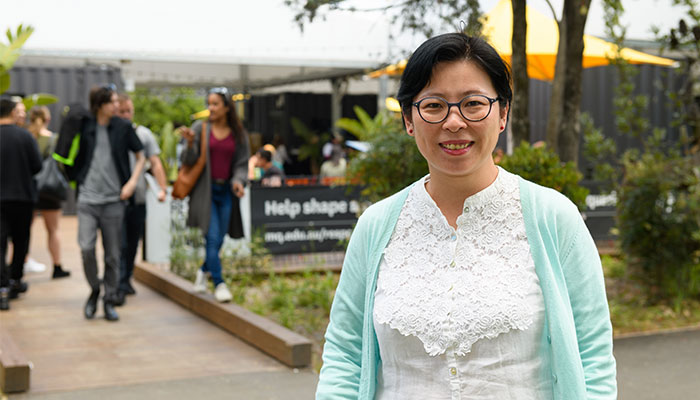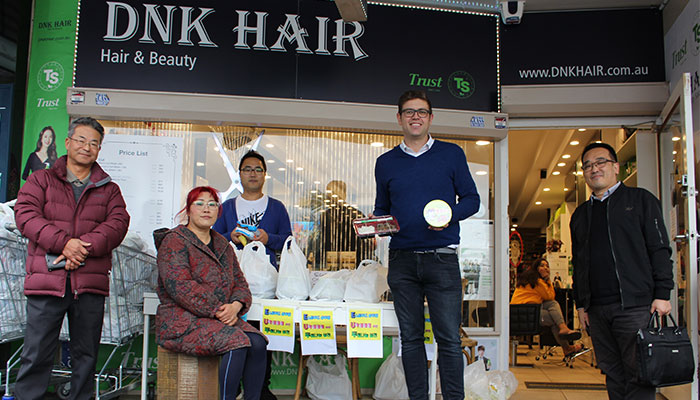A Macquarie University study in partnership with City of Ryde council has uncovered some international students living in Sydney’s Ryde area experience racism, though overall the research found the area to be a safe place.

Education campaign: Dr Alice Chik, pictured, said her research found overall the City of Ryde was a safe place to live.
Report co-author Dr Alice Chik, Associate Director of Macquarie’s Multilingualism Research Centre, says focus group interviews and street surveys of more than 400 young students – conducted before the pandemic hit – showed international students are likely to experience one incident of racism during their time in Australia, and the incident is most likely to be casual or verbal.
The multilingual, multicultural respondents all study in Ryde, and in 2019, 64 per cent of them had been in Australia for less than two years.
One reported being slapped on the face while on a train to the Blue Mountains; another reported a hijab-wearing friend fleeing a supermarket after an older woman rammed a shopping trolley into her own cart, twice.
International students are a great addition to our community and make it richer and more diverse.
“But overall we actually find that Ryde as a city is very safe,” says Chik, who is also a member of the council’s Multicultural Advisory Committee. “The racist incidents reported by students were in specific areas, such as around shopping areas and on public transport, and in or near Macquarie Park, or in the Macquarie Centre area.”
The study is part of a wider push by City of Ryde through its Racism: It Stops With Me campaign, supported by Macquarie University, to combat prejudice in the area –one of Australia’s most diverse communities with 48 per cent of residents speaking a language other than English at home.
The report maps where the racist incidents have occurred around Ryde, and its recommendations include information campaigns and efforts to better include international students in community and civic life.
City of Ryde Mayor Jerome Laxale says the council is committed to establishing anti-racism as the norm, and efforts to fight racism are more crucial than ever.
“International students are a great addition to our community and make it richer and more diverse,” he says.
“During coronavirus, unfortunately we have seen locally and across the country increased incidents of racism towards the Asian Australian community, and international students in particular. As part of the council’s ongoing commitment to anti-racism, we need to do what we can to combat that, and working with the university and the community is an important way of doing it.”
Stamping out casual racism
In 2018, racist posters plastered around the Ryde area made national news, prompting the council and the university to take a close look at the experience of Ryde’s international students, whose top five countries of origin as of April 2020 are China (47 per cent), India (19 per cent), Nepal (10 per cent), Vietnam (8.5 per cent), and Bangladesh (7 per cent).

It's not OK: City of Ryde Mayor Jerome Laxale, pictured here with local residents, is encouraging international students to speak out if they experience incidents of racism.
“The population of City of Ryde is 131,000, including 13,266 international students in higher education who live there,” Chik says. “They are a large section of the community and are less supported and more likely to be isolated than other culturally and linguistically diverse (CALD) groups in Ryde, given they are away from their families.”
In relation to respondents’ perceived treatment by others, more than 90 per cent of the surveyed students reported hardly ever or never having been called names or insulted because of their language, cultural or religious background. Just over 9 per cent said they have being called names or insulted often or very often.
However, casual racism was a more common experience: 12.9 per cent reported that some people act as if they are not to be trusted, and nearly 20 per cent said they were treated with disrespect often or very often because of their background.
One student gave the example of being in a supermarket and seeing a cashier being cheerful and friendly to the Australians in front of and behind her in the queue, but abrupt when it was her turn at the checkout.
Confusion over what racism is
The study found that many international students are not sure of the definition of racism, having not been subjected to it in their home country. They are also unsure what they should do, reporting wise, if they experience a racist incident – and even if they should report it at all.
- Seven positive outcomes of COVID-19
- Please explain: why can you see the sun and the moon at the same time?
“A lot of international students mention they are wary that if they report any kind of crime, their visa may be revoked,” Chik says.
“Also, depending on their own personal experience and background, a lot of students may be fearful of police.
“And the other thing is, they may not actually know racism is not acceptable and that it is not legal in Australia.”
In response, Ryde Council has commissioned the Multilingualism Research Centre to produce pamphlets for wide distribution around Ryde, targeting not just international students but the community as a whole, including its CALD residents.
The pamphlets will include information on what racism is, the reporting mechanisms for people who experience it, and what bystanders can do if they witness it.
Says Mayor Jerome Laxale: “We want to encourage people to speak out.
As community leaders, we need to be the first to denounce racism and lead our community to say this is not OK.”
Dr Alice Chik is a Senior Lecturer in the School of Education and Associate Director of the Multilingual Research Centre. The report, International students’ experience of racism: A City of Ryde report, will be released in July.



